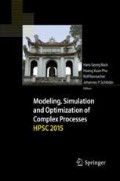Abstract
In recent years route planning has been greatly facilitated by car navigation systems. The desire for resource-efficient traveling has increased, a fact that is reflected by a higher demand for hybrid vehicles. The combination of electric motor and combustion engine adapted to the specific driving situation clearly reduces fuel consumption in comparison to vehicles with a conventional combustion engine. Up to this point, despite the fact that energy consumption and travel time are significantly affected by the drivers individual driving style, the driver has mainly been excluded. The aim of this project is to develop a dynamic model to calculate the optimal power train control—including the route planning. Taking into account the maximum travel time of the entire travel route in combination with energy-minimized driving, this approach allows us to obtain a new powerful concept. We present the model and its formulation as an optimal control problem, as well as some numerical results.
Access this chapter
Tax calculation will be finalised at checkout
Purchases are for personal use only
References
Back, M.: Prädiktive Antriebsregelung zum energieoptimalen Betrieb von Hybridfahrzeugen. Dissertation, Universität Karlsruhe (2006)
Burtchen, A., Maurer, H., Pickenhain, S.: Numerical treatment of the optimal energy control problem of hybrid vehicles. In: IEEE Conference on Decision and Control, Las Vegas (2016)
Föll, A., Müller, M., Martin, B., Pandit, M., Weber, M.: Predictive Gear Scheduling – Funktionsweise von prädiktiv geregelten Schaltprogrammen mit Berücksichtigung von Fahrzeugumfelddaten. VDI-Berichte 1610, 417–436 (2001)
Grüne, L., Pannek, J.: Nonlinear Model Predictive Control. Theory and Algorithms. Springer, London (2011)
Guzzella, L., Onder, C.: Introduction to Modeling and Control of Internal Combustion Engine Systems. Springer, Berlin/Heidelberg (2009)
Guzzella, L., Sciarretta, A.: Vehicle Propulsion Systems. Introduction to Modeling and Optimization. Springer, Berlin/Heidelberg (2013)
Inagawa, T., Tomomatsu, H., Tanaka, Y., Shiiba, K. et al.: Shift control system development (NAVI⋅ AI-SHIFT) for 5 speed automatic transmissions using information from the vehicle’s navigation system. SAE Technical Paper (2002). doi:10.4271/2002-01-1254
Lykina, V.: Beiträge zur Theorie der Optimalsteuerungsprobleme mit unendlichem Zeithorizont. Dissertation, BTU Cottbus (2010)
Müller, M.: Ein Beitrag zur Entwicklung von Assistenzsystemen für vorausschauende Fahrzeugführung im Straßenverkehr. Shaker, Aachen (2005)
Palma, V.G.: Robust updated MPC schemes. Phd Thesis, University of Bayreuth (2015)
Pickenhain, S.: Hilbert space treatment of optimal control problems with infinite horizon. In: Bock, H.G., Phu, H.X., Rannacher, R., Schloeder, J.P. (eds.) Modeling, Simulation and Optimization of Complex Processes - HPSC 2012, pp. 169–182. Springer, Cham (2014)
Rajamani, R.: Vehicle Dynamics and Control. Mechanical Engineering Series. Springer, New York/Dordrecht/Heidelberg/London (2012)
Schori, M., Boehme, T.J., Frank, B., Schultalbers, M.: Calibration of parallel hybrid vehicles based on hybrid optimal control theory. In: 9th IFAC Symposium on Nonlinear Control Systems (NOLCOS 2013), Toulouse, France (2013). doi:10.3182/20130904-3-FR-2041.00086
Schwan, C.: Ein Beitrag zur energieoptimalen Steuerung eines Hybridfahrzeuges. Masterthesis, BTU Cottbus-Senftenberg (2014)
Acknowledgements
The authors gratefully acknowledge the cooperation and expertise provided by the IAV GmbH, Berlin and the Wankel SuperTec GmbH, Cottbus.
Author information
Authors and Affiliations
Corresponding author
Editor information
Editors and Affiliations
Rights and permissions
Copyright information
© 2017 Springer International Publishing AG
About this paper
Cite this paper
Pickenhain, S., Burtchen, A. (2017). Optimal Energy Control of Hybrid Vehicles. In: Bock, H., Phu, H., Rannacher, R., Schlöder, J. (eds) Modeling, Simulation and Optimization of Complex Processes HPSC 2015 . Springer, Cham. https://doi.org/10.1007/978-3-319-67168-0_15
Download citation
DOI: https://doi.org/10.1007/978-3-319-67168-0_15
Published:
Publisher Name: Springer, Cham
Print ISBN: 978-3-319-67167-3
Online ISBN: 978-3-319-67168-0
eBook Packages: Mathematics and StatisticsMathematics and Statistics (R0)

